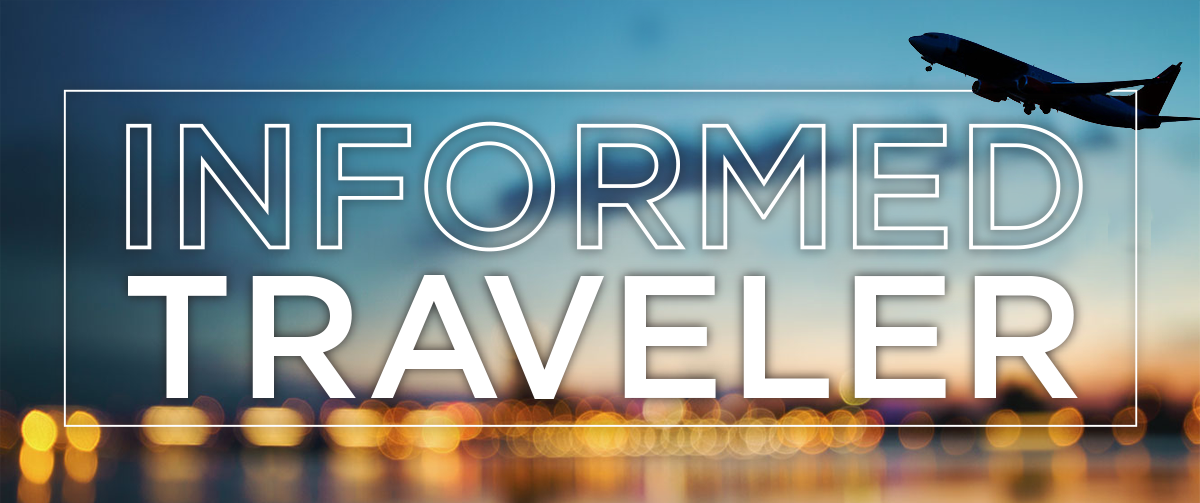Lawyers Travel's weekly client e-newsletter, the Informed Traveler, keeps readers updated on travel industry news and trends.
Following is a recap of July's top 5 (most clicked by Lawyers Travel's clients) e-newsletter stories.
1. EU TO LAUNCH ETIAS VISA WAIVER REQUIREMENT IN 2024
The European Union (EU) plans to launch its previously announced European Travel Information and Authorization System (ETIAS) in 2024 after delaying its release several times over the past three years. ETIAS is an electronic entry authorization system designed to screen and register non-EU travelers as a way to protect and strengthen European borders.
While the EU has not released an exact launch date, it is expected that early next year visa-exempt travelers from over 60 countries, including the US, UK, and Canada, will be required to obtain an ETIAS waiver prior to entering any of the 30 member countries. ETIAS member countries include: Austria, Belgium, Bulgaria, Croatia, Cyprus, Czech Republic, Denmark, Estonia, Finland, France, Germany, Greece, Hungary, Iceland, Italy, Latvia, Liechtenstein, Lithuania, Luxembourg, Malta, Netherlands, Norway, Poland, Portugal, Romania, Slovakia, Slovenia, Spain, Sweden, and Switzerland.
Travelers planning a trip to an ETIAS member country will be required to fill out an online application granting them permission to visit. Applying for an ETIAS will only take about 10 minutes and should be completed at least five days prior to departure. To apply, travelers must have a valid passport from an eligible country, travel details, debit or credit card, and email address. Applicants between the ages of 18 and 70 will pay a €7 (~$7.75) processing fee.
Most applicants will receive an approval email within minutes, but in some cases the process may take up to 30 days. Once approved, the ETIAS waiver will be valid for three years, or until the traveler’s passport expires, whichever comes first. Travelers with an ETIAS waiver will be allowed to stay for up to 90 days within a 180-day period.
While no action is required at this time, travelers should be aware of the upcoming ETIAS requirement. We will continue to provide updates as they become available.
2. UNITED AIRLINES UNVEILS NEW DOMESTIC FIRST-CLASS SEATS
United Airlines has announced a new domestic first-class seat that includes a wireless charging station in every arm rest. The new United First seat also features vegan leather upholstery, 13-inch seatback screens, 18-inch tray tables, Bluetooth connectivity, privacy screens, and an ergonomist-designed cushion. United will debut the seats later this month, with rollout continuing through the summer. The carrier expects the United First option to be available on 200 domestic planes by 2026, including its fleet of 737 NGs, A321neos, and 737 MAXs. "This new United First seat is designed around the modern traveler – more charging options, bigger spaces for devices, food, drinks and personal items and extra privacy," said Mark Muren, United Managing Director of Identity, Product and Loyalty. "As we evolve the onboard experience, we're upending old industry norms and anticipating future needs to accommodate the new ways people live and travel."
3. US RECOMMENDS AMERICANS RECONSIDER TRAVEL TO CHINA DUE TO RISK OF WRONGFUL DETENTION
The US State Department has updated its travel advisory for China, recommending that Americans should reconsider travel due to the risk of wrongful detention, reports CNN. Although the previous advisory also listed mainland China as a “Level 3: Reconsider Travel” destination, it was due to the risk of “arbitrary enforcement of local laws.” The risk of wrongful detention was listed as a reason for US travelers to “exercise increased caution” in that advisory, which was issued in March. A State Department spokesperson explained that because the Chinese government “continues to engage in this practice” of wrongful detention, “the Travel Advisory has been updated to advise US citizens to reconsider travel to Mainland China due to the risk of wrongful detention.” The updated advisory comes amid a period of heightened tensions between the US and China. Secretary of State Antony Blinken met with Chinese officials in Beijing last month in the hope of repairing the deteriorating relationship between the two countries, while Treasury Secretary Janet Yellen will visit the People’s Republic of China later this week, in an effort to do the same.
4. US PASSPORT DELAYS ARE AFFECTING SUMMER TRAVEL PLANS
US passport renewal services are facing increased wait times as the busy summer travel season ramps up, reports Business Insider. According to the US State Department, processing times for routine passport renewals are now up to 13 weeks, with expedited services increased to 7-9 weeks. That doesn't include delivery times, which can add "several weeks" more, the department says. Travelers have been facing passport renewal backlogs for the past two years, as the government struggles to keep up with post-pandemic travel demand. The State Department says it is getting a record 500,000 passport applications a week. That is on track to top the 22 million passports issued last year. To help with the backlog, the department has increased staffing levels this year and is currently hiring additional staff, adding that a majority of applicants receive their passports within the published timeframes. But some frustrated travelers say they still haven't received their passports despite applying multiple months in advance and are now faced with canceling their trips. The State Department recommends that any individuals who applied and have not received their passport within five days of planned international travel should call the National Passport Information Center at 1-877-487-2778 to make an appointment at a passport agency.
5. TSA TO EXPAND FACIAL RECOGNITION
The Transportation Security Administration (TSA) plans to roll out facial recognition at security checkpoints in 400 more airports in the coming years after success and early results of its pilot program, reports Travel Pulse. The pilot program is currently implemented at 25 airports across the country, with a 97 percent success rate, according to the TSA. The agency hopes to someday get to a point where it does not need physical identification, such as a driver’s license, but relies solely on facial recognition. However, opponents of the program say that facial recognition is a violation of personal freedoms, and that the TSA is improperly coercing people to participate and not allowing them to opt out. The TSA has refuted the claims, reiterating that participation is voluntary and that there is signage at the airport that allows travelers to simply tell an agent that they do not wish to participate and prefer the use of physical IDs.



